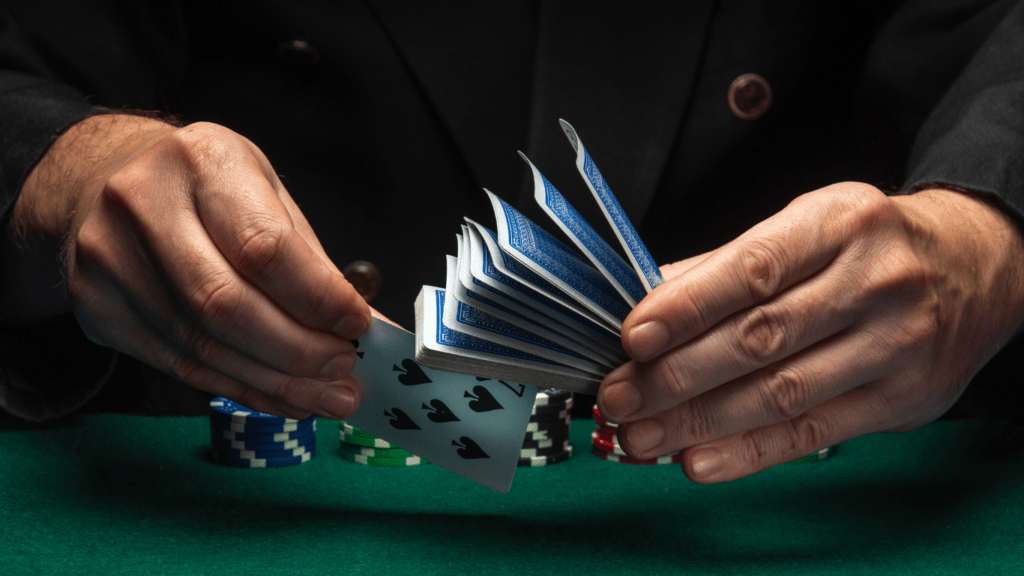Exploring Common Gambling Myths
Gambling myths can lead to erroneous beliefs that affect decisions. It’s crucial to distinguish fact from fiction to gamble responsibly.
The Myth of the ‘Hot’ Machine
Many believe a slot machine that’s been paying out regularly is ‘hot’ and likely to continue doing so.
However, each spin on a slot machine is an independent event determined by a Random Number Generator (RNG).
No pattern affects the likelihood of winning or losing over time. Seeing patterns where there are none leads to misguided betting strategies.
The Gambler’s Fallacy Explained
The Gambler’s Fallacy states that past gambling outcomes influence future ones. For example, after several losses, one might think a win is ‘due.’
This belief contradicts the nature of independent events like coin flips or roulette spins. Each outcome is random and unaffected by previous results, making this fallacy a root cause of poor gambling decisions.
The Role of Skill and Luck
Skill and luck both play crucial roles in gambling, though their influence varies depending on the game.
Can You Control the Outcome?
In games like poker, skill dramatically impacts outcomes.
- Knowledge of game mechanics, strategy, and player psychology contribute to success.
- For instance, skilled poker players consistently outperform novices due to their ability to read opponents and make calculated bets.
- In contrast, games like slots rely solely on luck. A random number generator (RNG) determines results, making predictions or control impossible.
- Skill doesn’t influence these games, and each spin is independent of previous outcomes.
The Illusion of Patterns
Many gamblers believe in detecting patterns, but patterns in random sequences don’t exist. It’s a cognitive bias to see order in randomness.
For example, in roulette, seeing several red outcomes doesn’t mean black is due next. Each spin remains independent with no influence from past spins.
Casinos exploit this illusion through the “gambler’s fallacy.” Pit bosses know players might increase bets based on perceived streaks, yet streaks don’t change odds.
Random number generation ensures no correlation between spins or rolls, debunking any notion of predictable patterns.
Probability and Odds in Gambling
Understanding probability and odds in gambling is crucial for dispelling myths and misconceptions.
Myth of Due Wins
The “due win” myth suggests that after a series of losses, a win becomes imminent. This idea is false. Each game outcome remains independent of previous results.
For example, in a fair coin toss, the odds stay 50/50 regardless of past flips.
Casinos design games like roulette and slots to ensure each spin or hand operates independently, debunking the notion of “due” outcomes.
Misunderstandings of Probability
Probability misconceptions often lead gamblers to make irrational decisions. Probability expresses the likelihood of an event occurring, typically as a fraction or percentage.
For instance, the probability of rolling a six on a fair die is 1/6 or about 16.67%. Understanding these odds helps gamblers set realistic expectations.
Many gamblers believe that rarer outcomes are “overdue” after a sequence of common results, yet in games with replacement, each event’s probability remains unchanged.
Proper grasp of these concepts allows for informed decision-making and enhances responsible gambling practices.
Popular Strategies and Their Flaws

Many gamblers rely on popular strategies to beat the odds, yet these tactics often have critical flaws that undermine their effectiveness.
Betting Systems and Their Effectiveness
Betting systems, like:
- Martingale
- Fibonacci
promise easy wins by altering bet sizes based on prior results.
The Martingale System advises doubling a bet after each loss, assuming an eventual win will recover all losses.
However, in practice, this strategy can quickly lead to large losses because it doesn’t account for the casino’s maximum bet limit.
A long losing streak may deplete funds faster than anticipated, making recovery impossible within practical constraints.
The Fibonacci System relies on a sequence where each bet equals the sum of the previous two bets. Though this approach appears less aggressive, it still assumes an inevitable win.
Yet, like the Martingale System, it can escalate losses during prolonged losing periods.
Limits on table stakes and bankroll constraints often render these systems ineffective in achieving consistent profits.
The Impact of Betting Progression
Betting progression strategies, including positive and negative progressions, aim to capitalize on winning streaks or minimize losses during losing streaks.
Positive progression involves increasing bets after a win, under the belief that wins cluster together.
However, since each gambling event is independent, this strategy’s success hinges purely on short-term luck, which can’t be reliably predicted.
Negative progression strategies, such as the D’Alembert and Labouchere systems, suggest increasing bets after losses to recover losses and gain profits.
The D’Alembert System adds a unit to the bet after a loss and subtracts a unit after a win, while Labouchere involves tracking a series of numbers to determine bet sizes.
Though these methods attempt to balance wins and losses, they fail against prolonged streaks of bad luck.
Increasing bets after losses can rapidly exhaust a player’s bankroll, proving these progressions unreliable for long-term gains.
Overall, understanding these strategies’ flaws emphasizes the importance of approaching gambling with a clear mind and realistic expectations.



